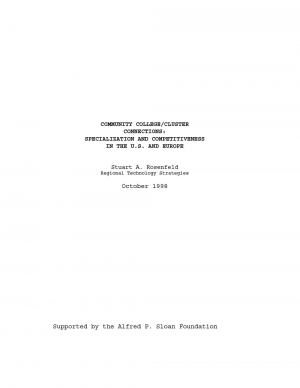
This paper examines four community colleges in Ireland, Denmark, California, and Mississippi that play central economic development roles in their communities by specializing in the skills and knowledge needed by local industry and the regional economy.
These colleges ally themselves with the businesses they serve through advisory or trade councils, by participating in business associations or working on regional boards and organizations. The college staffs are drawn from both industry and education, and industrial advisory boards review curricula and plans.
Colleges receive equipment, financial support, and access to industry-specific knowledge; businesses gain advice and employees who are more productive. The regions’ economies benefit from the mobility of the graduates and the flow of information between firms. Job offers at high relative wages are plentiful in each location studied, and the close ties between faculty and employers and informal labor market information networks make traditional college placement services superfluous. Thus, the college–industry clusters benefit the school, the industry, the region, and the students.
A brief of this paper is available for download.
